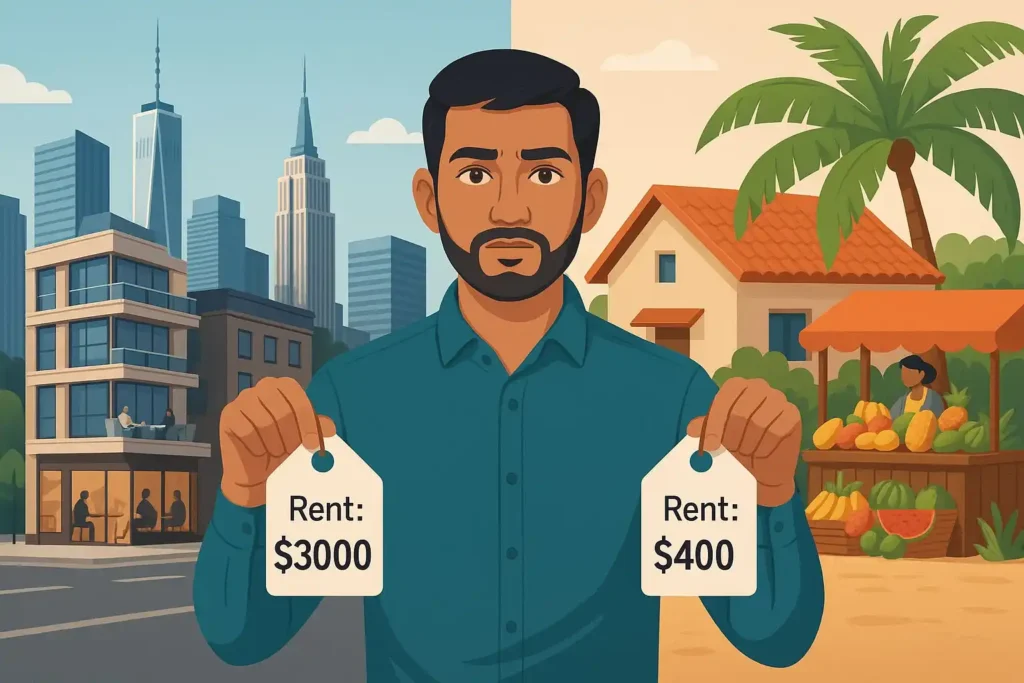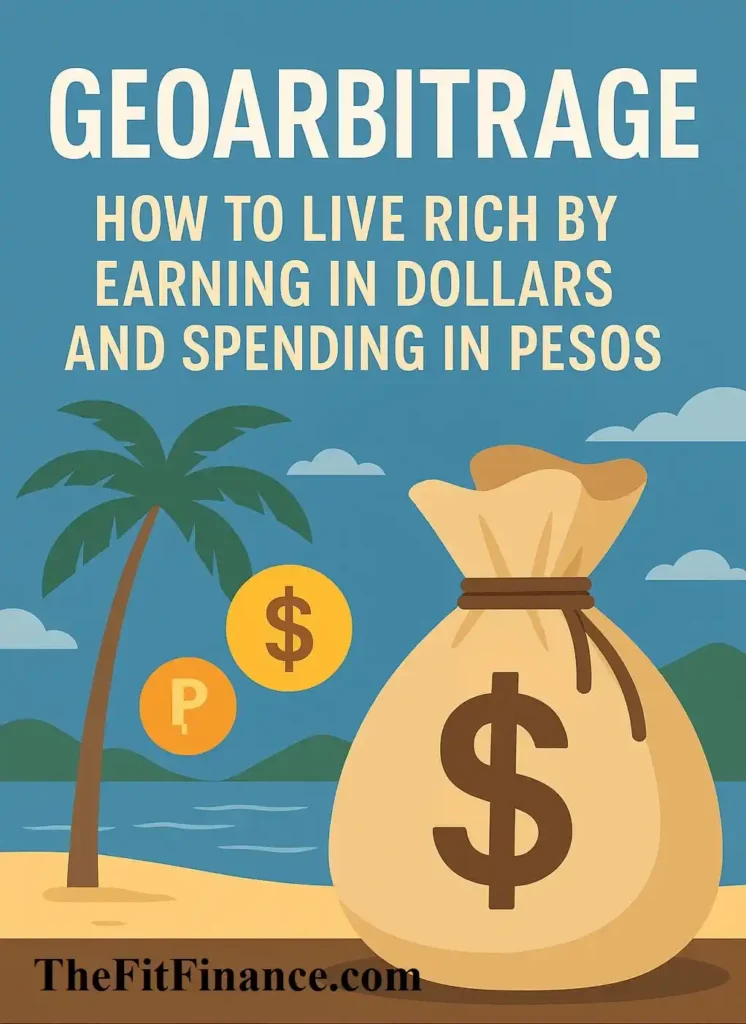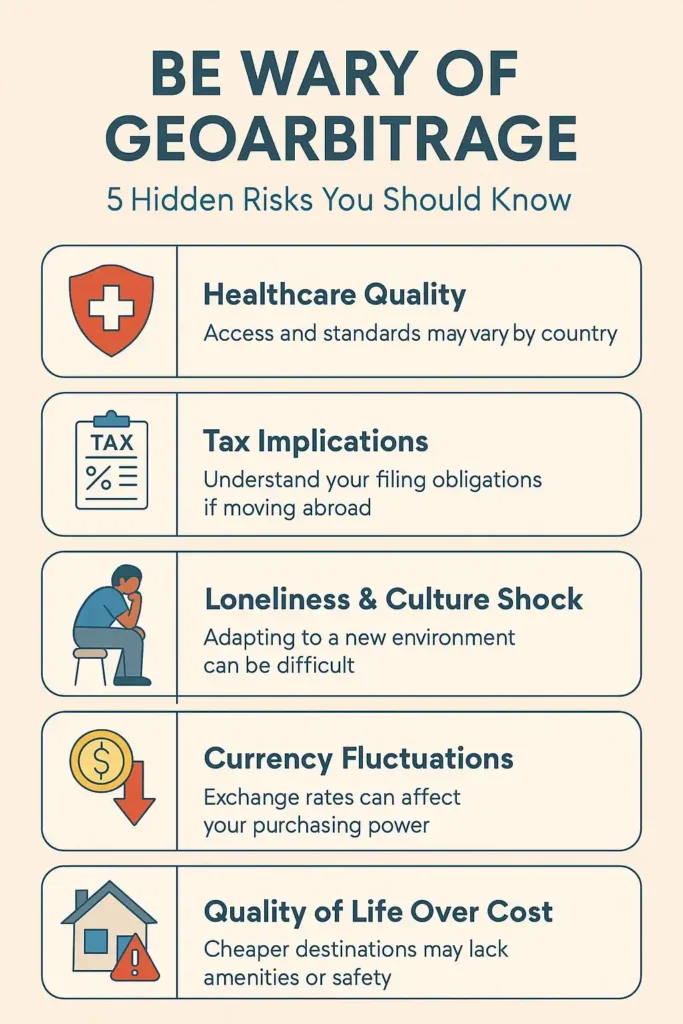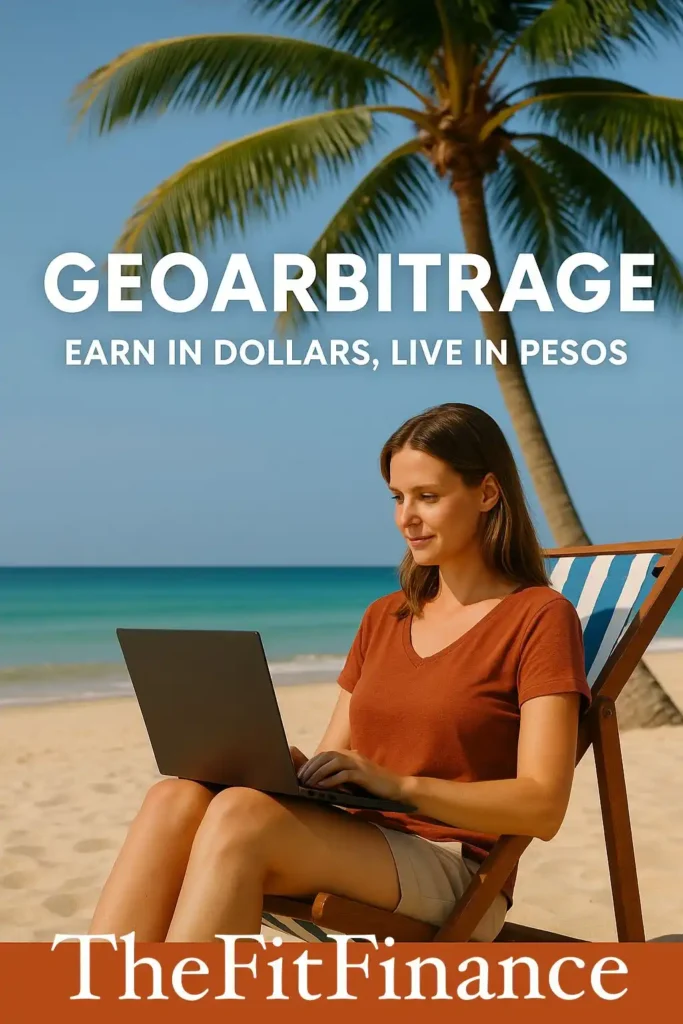Living the $10K Life on a $2K Budget 🧭
Imagine sipping coconut water under a palm tree in Bali, running your business from your laptop, and paying less in a month than your rent back in the U.S. Sounds like a travel fantasy?
It’s not.
Welcome to geoarbitrage — the smart person’s strategy to live luxuriously while spending way less, all by leveraging global differences in cost of living.
In this guide, we will break down exactly what geoarbitrage is, how people are using it to retire early, build wealth faster, and upgrade their lifestyle — without earning more, just by spending wisely across borders.
Let’s dive into the playbook.
Table of Contents
What is Geoarbitrage?
Geoarbitrage (short for geographic arbitrage) is the practice of earning income in a high-cost country (like the U.S. or UK) while living or spending in a lower-cost country (like Mexico, Thailand, or Portugal). The concept gained fame through Tim Ferriss’s book The 4-Hour Workweek.
It’s like financial jiu-jitsu: using global cost differences to stretch your income or savings 3x to 5x further.
Example: If you earn $4,000/month remotely, and you move from San Francisco to Chiang Mai, your monthly expenses could drop from $4,500 to just $900 — saving you over $40,000/year.

🌍 Why Geoarbitrage is More Relevant Than Ever in 2025
✅ Remote Work is the New Normal
After the pandemic, remote work exploded. More companies are open to distributed teams, freelancers, and digital nomads than ever before.
✅ Inflation in Western Countries
As the U.S. struggles with inflation, many professionals are looking abroad where their dollars go further.
✅ FIRE Movement Fuel
Geoarbitrage is a favorite among FIRE (Financial Independence, Retire Early) followers to speed up their retirement timeline by drastically reducing expenses.
🔥 Real-Life Geoarbitrage Success Stories
✈ Digital Nomad Daniel
• Income: $4,500/month from freelance coding
• Moved from: NYC to Medellín, Colombia
• Expenses dropped: $4,000 ➝ $1,200
• Savings rate: Jumped from 10% ➝ 70%
• Outcome: Bought his first rental property in just 2 years
🏝 Retired Couple Mike & Susan
• Income: $2,800/month in pension + investments
• Moved from: Arizona to Puerto Vallarta, Mexico
• Monthly costs: $1,000 all-in
• Outcome: Retired 8 years early and travel every 3 months
👪 Who Should Consider Geoarbitrage?
🎓 Young Professionals
Perfect for 20–35-year-olds with remote-friendly jobs — build wealth while having unforgettable travel experiences.
🏡 Families
Yes, families do it too — many move to Portugal, Bali, or Costa Rica where international schools and healthcare are more affordable.
👴 Retirees
Stretch your retirement savings in style. Many retirees spend less and live better in Southeast Asia or Latin America.

🌏 Best Geoarbitrage Countries / Destinations for 2025
| 🌍 Destination | 💰 Monthly Cost (1 Person) | 🚀 Visa Ease | ❤ Why It Rocks |
|---|---|---|---|
| Thailand | $900 – $1,200 | Medium | Digital nomad paradise, great food |
| Mexico | $800 – $1,100 | Easy | Close to US, warm weather |
| Portugal | $1,200 – $1,600 | Easy | Safe, scenic, expat-friendly |
| Vietnam | $700 – $1,000 | Moderate | Amazing street food, low rent |
| Colombia | $800 – $1,100 | Moderate | Beautiful cities, low taxes |
| Georgia (Europe) | $700 – $900 | Easy | 1-year visa, great food, no tax on foreign income |
📈 How Geoarbitrage Accelerates Your FIRE Goals
Let’s say you save $500/month in the U.S.
After geoarbitrage, you could save $2,500/month living in Vietnam.
That is a 5X acceleration toward your FIRE number.
In numbers:
Metric |
Living in U.S. |
Living in Vietnam |
|
Monthly Income |
$4,000 |
$4,000 |
|
Monthly Expenses |
$3,500 |
$1,000 |
|
Monthly Savings |
$500 |
$3,000 |
|
FIRE Timeline |
25–30 years |
7–10 years |
🛠 How to Start Your Geoarbitrage Journey (Step-by-Step)
- Go Remote
• Freelance, start a business, or negotiate remote work with your employer.
• Sites: Upwork, Toptal, RemoteOK, FlexJobs - Pick Your Country
• Use NomadList or Numbeo to compare costs
• Choose based on visa rules, internet, safety, weather, healthcare - Plan Finances
• Open international-friendly bank accounts (like Wise or Revolut)
• Get a travel insurance or expat insurance plan
• Budget monthly living + flight + buffer - Test First
• Don’t sell everything! Try a 1–3 month stay.
• Use Airbnbs or local rentals to get a feel - Go Slow and Smart
• Learn basic language phrases
• Join expat or nomad communities
• Respect the culture, laws, and pace of life

⚠ Be Wary of Geoarbitrage: The Hidden Risks You Should Know
Geoarbitrage paints a beautiful picture—earning in a strong currency like USD or EUR while spending in a low-cost country like Thailand, Mexico, or Vietnam. But as tempting as it sounds, it’s not all sunshine and coconuts. The reality? There are real risks, emotional challenges, and lifestyle trade-offs that can catch you off guard if you are not fully prepared.
Visa Limitations: Make sure your stay is legal
Loneliness: Especially if you go solo
Cultural Misunderstandings: Take time to adapt
Health Insurance: Always have a backup plan
Tax Confusion: Hire an accountant who knows international rules
Here are the major concerns to be wary of before you pack your bags:
- 🏥 Health Care & Insurance Gaps
Many geoarbitrage hotspots don’t offer the same quality or accessibility in healthcare that you’re used to in your home country. Expats often struggle with understanding the healthcare system, dealing with language barriers during emergencies, or accessing specialist care. While private insurance is an option, it can be expensive or exclude key coverage.
Pro Tip: Always research hospitals in your destination, compare expat health insurance plans, and understand local health standards before relocating.
- 🧾 Tax Surprises & Legal Compliance
Just because you’re earning online or living abroad doesn’t mean you’re exempt from taxes. Many digital nomads assume they’re tax-free because they live outside their country. In reality, the IRS (for Americans) and tax agencies in other countries may still require you to file—and in some cases, pay taxes in both countries.
Also, you may need to apply for visas, work permits, or register as a resident, depending on how long you stay.
Action Step: Consult a cross-border tax advisor and understand treaties like the Foreign Earned Income Exclusion (FEIE) or Double Taxation Avoidance Agreement (DTAA) if applicable.
- 😓 Loneliness, Culture Shock & Integration
Geoarbitrage isn’t a permanent vacation. Living far from home, friends, and your native language can take a toll. Expats often experience social isolation, cultural fatigue, or frustration with local bureaucracy. What starts as an adventure can lead to homesickness, especially if you’re a solo traveler or retiree.
Warning Sign: If you rely heavily on routines, structure, or community, geoarbitrage might feel more like exile than empowerment.
- 📉 Currency Volatility
Imagine your USD salary suddenly losing 20% value because of exchange rate swings. If the local currency appreciates (or your home currency depreciates), your monthly expenses could spike. This could throw off your budget or make your “low-cost” destination unexpectedly expensive.
Avoid This Trap: Keep some funds in local currency, use multi-currency wallets like Wise or Revolut, and track forex trends if your income or savings depends on conversion.
- 📉 Quality of Life ≠ Cost of Living
Cheaper doesn’t always mean better. A $400/month apartment might save you money, but what if it’s far from city centers, lacks basic comforts, or compromises your safety? You might find yourself sacrificing too much for the sake of affordability—and that’s a dangerous line.
Key Insight: Do not chase the cheapest lifestyle. Chase the right balance between affordability, safety, comfort, and happiness.
Precautionary: Do It Smartly
Geoarbitrage can be a life-changing financial strategy—but only if approached wisely. A hasty move without deep research could backfire. The key is not to get lured by Instagrammable fantasies or oversimplified advice.
Instead, test before you commit. Try a short-term stay (2–3 months), calculate your real monthly expenses, network with local expats, and understand visa, tax, and healthcare implications.
✨ Pro Geoarbitrage Rule:
“Live like a local, plan like a CFO.”
Do that, and you’ll not just survive abroad—you will thrive.

🧠 Tools & Resources
| Tool | Use |
|---|---|
| NomadList | Cost, weather, internet speed comparisons |
| Wise | Send money with low FX fees |
| Revolut | Global banking app for travelers |
| TransferWise | Currency transfers |
| Expatistan | Cost of living index |
| Numbeo | Crowd-sourced data on rent, groceries, safety |
❓ FAQs About Geoarbitrage: You Need to Know
✅ 1. What is Arbitrage?
Arbitrage is the practice of taking advantage of price differences between two or more markets. In finance, it often means buying a commodity or asset in one market at a lower price and selling it in another at a higher price for a profit. The same concept applies to lifestyle arbitrage — earning in a high-income country while spending in a low-cost country.
✅ 2. What is Geoarbitrage?
Geoarbitrage, short for geographic arbitrage, is a personal finance strategy where you earn money in a high-income location (like the U.S. or U.K.) and live in a lower-cost country (like Thailand or Mexico) to maximize your lifestyle and savings. It’s a popular strategy among digital nomads, early retirees, and remote workers.
✅ 3. What is Location Arbitrage?
Location arbitrage is another term for geoarbitrage. Both involve relocating to areas with a lower cost of living while maintaining an income from a higher-paying economy. The terms are often used interchangeably.
✅ 4. Are Geoarbitrage and Location Arbitrage the Same?
Yes. Geoarbitrage and location arbitrage are essentially the same strategy. The term “geoarbitrage” became popular thanks to Tim Ferriss’s The 4-Hour Workweek, but both refer to optimizing income and expenses based on geographic location.
✅ 5. What is the Meaning of Global Arbitrage?
Global arbitrage refers to the broader concept of taking advantage of economic, labor, or cost differences across countries. Geoarbitrage is a form of global arbitrage, focused on individuals rather than corporations.
✅ 6. What is Lifestyle Arbitrage?
Lifestyle arbitrage is the intentional relocation to places where your money goes further, not just for cost savings, but to improve overall quality of life — including weather, culture, work-life balance, or family priorities. Geoarbitrage is one of the most powerful forms of lifestyle arbitrage.
✅ 7. Is Geoarbitrage Legal?
Absolutely. Geoarbitrage is 100% legal. However, you must comply with local visa laws, taxation rules, and stay durations. Always consult a cross-border tax expert and immigration consultant to stay compliant.
✅ 8. Can Families Do Geoarbitrage?
Yes, families can practice geoarbitrage successfully. In fact, it’s often more impactful due to higher collective expenses. Many expat families relocate to countries like Portugal, Costa Rica, or Malaysia where healthcare, schooling, and lifestyle costs are lower.
✅ 9. Is Geoarbitrage Only for Rich People?
Not at all. Geoarbitrage is for anyone looking to optimize their lifestyle and financial future. From freelancers to retirees, this strategy is accessible to middle-class individuals who can work remotely or rely on passive income.
✅ 10. How to Geoarbitrage?
To start geoarbitraging:
- Earn in a strong currency (USD, Euro, GBP).
- Choose a country with lower cost of living.
- Check visa and residency requirements.
- Handle tax planning (dual taxation rules).
- Budget realistically for healthcare, housing, etc.
- Start with a trial period in the chosen country.
✅ 11. Do I Need to Know the Local Language?
Not necessarily. Many expats thrive in countries where English is widely spoken. However, learning the local language enhances your experience, safety, and ability to integrate. Tools like Duolingo or local classes can help.
✅ 12. How Do Taxes Work If I Move Abroad?
Taxes depend on your citizenship, residency status, and income source. For example:
• U.S. citizens must file taxes even while abroad but may qualify for the Foreign Earned Income Exclusion (FEIE).
• Other nationals may benefit from tax treaties or territorial taxation.
Always consult a cross-border tax professional to understand your obligations.
✅ 13. What is Geographical Arbitrage in International Finance?
In international finance, geographical arbitrage involves capitalizing on differences in pricing, interest rates, or financial instruments across countries. It’s similar in concept to geoarbitrage but executed on a corporate or investment level.
✅ 14. What is the Digital Arbitrage Strategy?
Digital arbitrage refers to outsourcing or leveraging labor, tools, or services in low-cost countries while serving clients or generating income in high-income countries. It’s popular among solopreneurs, agencies, and remote-first businesses.
✅ 15. What Are the Three Types of Arbitrage?
1. Spatial Arbitrage (Geoarbitrage) – Earning in one place, spending in another.
2. Temporal Arbitrage – Gaining value by delaying or timing a purchase/sale.
3. Risk Arbitrage – Profiting from expected events like mergers or regulatory gaps.
✅ 16. What is the Most Common Arbitrage?
In lifestyle terms, geoarbitrage is the most common arbitrage being adopted by individuals today, especially among remote workers and FIRE (Financial Independence Retire Early) followers.
Related Articles: You will Love to Read
Can a Middle-Class Boy Become Rich? Proven Path to Millions
Double Your Savings in Just One Year: Proven Strategies for Rapid Financial Growth
✅ Final Takeaway: It is the Time to Geoarbitrage Like a Pro
The world has changed. You are no longer bound by one zip code, one currency, or one way of living.
With geoarbitrage, you can:
• Retire earlier
• Live richer
• Save faster
• Experience more
All without needing to be a millionaire.
If you want to stop working to just survive and start living on your own terms, geoarbitrage is your golden ticket.
📌 Related Post You’ll Love:
How to Retire at 45 with a Ferrari and Zero Regrets: 5 Uncommon Money Moves You Can Start Today







